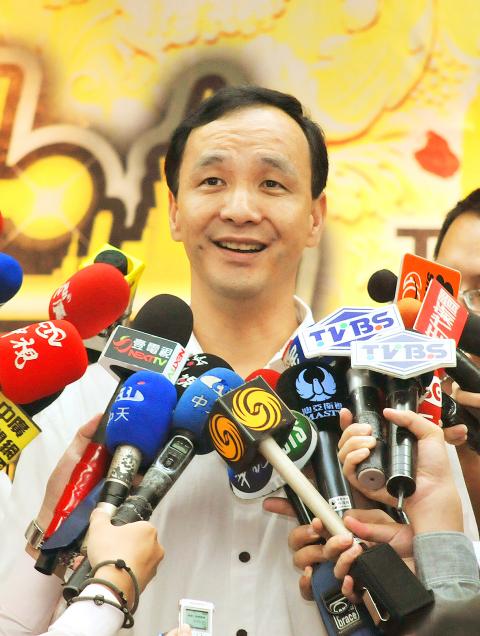Chinese Nationalist Party (KMT) officials yesterday struggled to clarify claims of alleged power struggles within the party revealed by US diplomatic cables recently released by WikiLeaks.
New Taipei City (新北市) Mayor Eric Chu (朱立倫), whose conversations with then-American Institute in Taiwan (AIT) director Stephen Young in 2008 and 2009 on struggles between figures within the KMT has caused a political storm, yesterday again denied making the comments, saying that President Ma Ying-jeou (馬英九) trusted him to be cautious when addressing sensitive issues.
“This is an unexpected disaster, but I will face it with courage ... I believe the content of the cables were the personal interpretations of Stephen Young, which are distorted and inaccurate,” he said yesterday after attending a city cooperation event at Taipei City Hall.

Photo: CNA
According to the cables, Chu, a KMT vice chairman at the time, told Young Ma was not as naive as former KMT chairman Lien Chan (連戰) when handling cross-strait relations, adding that Ma was trying to ease out the party’s “old guard,” including Lien and Legislative Speaker Wang Jin-pyng (王金平).
The cable also said Chu told Young shortly after Ma assumed the presidency in 2008 that Vice President Vincent Siew (蕭萬長) had recommended that then-premier Liu Chao-shuan (劉兆玄) form the Cabinet in order to thwart Straits Exchange Foundation (SEF) Chairman Chiang Pin-kung’s (江丙坤) attempt to take over as premier, the cables said.
In the cables, Chu said that prior to the presidential election in 2008, Wang had invited him to serve as his running mate after a fortunteller told Wang that he would become the party’s presidential nominee because Ma would be forced to withdraw from the race after being indicted on charges of alleged misuse of his special allowance.
Siew yesterday dismissed the content of the leaked cables, saying that as a long-time friend and colleague of more than 30 years, he would never try to ruin Chiang’s chances of serving as premier.
Wang yesterday also denied the claims and dismissed another leaked US cable pertaining to his criticism of Ma.
A cable dated Feb. 14, 2007, said Wang told Young that Ma’s presidential chances “were finished” following his indictment in a special allowance corruption case, and that the KMT would select a new presidential candidate.
While expressing his intention to replace Ma as the party’s presidential nominee, Wang criticized Ma as a “poor and ineffective leader.”
Wang also described Premier Wu Den-yih (吳敦義) as “too corrupt,” and Chiang as too powerless when discussing their presidential chances.
Wu yesterday said it was “impossible” for Wang to make such comments, adding that Young might have misunderstand Wang’s remarks.
“Maybe he heard it wrong because he is a foreigner. Maybe he didn’t hear it clearly,” he said.
Amid the rows sparked by the leaked cables, Chu yesterday dismissed concerns about his political future as a promising star in the KMT and a possible presidential candidate in 2016.
“Everyone [in the KMT] still has confidence in me,” he said.

Alain Robert, known as the "French Spider-Man," praised Alex Honnold as exceptionally well-prepared after the US climber completed a free solo ascent of Taipei 101 yesterday. Robert said Honnold's ascent of the 508m-tall skyscraper in just more than one-and-a-half hours without using safety ropes or equipment was a remarkable achievement. "This is my life," he said in an interview conducted in French, adding that he liked the feeling of being "on the edge of danger." The 63-year-old Frenchman climbed Taipei 101 using ropes in December 2004, taking about four hours to reach the top. On a one-to-10 scale of difficulty, Robert said Taipei 101

Taiwanese and US defense groups are collaborating to introduce deployable, semi-autonomous manufacturing systems for drones and components in a boost to the nation’s supply chain resilience. Taiwan’s G-Tech Optroelectronics Corp subsidiary GTOC and the US’ Aerkomm Inc on Friday announced an agreement with fellow US-based Firestorm Lab to adopt the latter’s xCell, a technology featuring 3D printers fitted in 6.1m container units. The systems enable aerial platforms and parts to be produced in high volumes from dispersed nodes capable of rapid redeployment, to minimize the risk of enemy strikes and to meet field requirements, they said. Firestorm chief technology officer Ian Muceus said

MORE FALL: An investigation into one of Xi’s key cronies, part of a broader ‘anti-corruption’ drive, indicates that he might have a deep distrust in the military, an expert said China’s latest military purge underscores systemic risks in its shift from collective leadership to sole rule under Chinese President Xi Jinping (習近平), and could disrupt its chain of command and military capabilities, a national security official said yesterday. If decisionmaking within the Chinese Communist Party has become “irrational” under one-man rule, the Taiwan Strait and the regional situation must be approached with extreme caution, given unforeseen risks, they added. The anonymous official made the remarks as China’s Central Military Commission Vice Chairman Zhang Youxia (張又俠) and Joint Staff Department Chief of Staff Liu Zhenli (劉振立) were reportedly being investigated for suspected “serious

Nipah virus infection is to be officially listed as a category 5 notifiable infectious disease in Taiwan in March, while clinical treatment guidelines are being formulated, the Centers for Disease Control (CDC) said yesterday. With Nipah infections being reported in other countries and considering its relatively high fatality rate, the centers on Jan. 16 announced that it would be listed as a notifiable infectious disease to bolster the nation’s systematic early warning system and increase public awareness, the CDC said. Bangladesh reported four fatal cases last year in separate districts, with three linked to raw date palm sap consumption, CDC Epidemic Intelligence